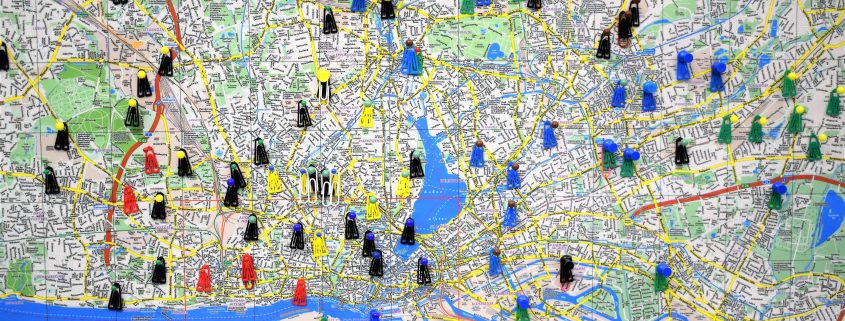5 Applications for Location-Based Data in 2020
Location-based data enables giving people relevant information based on where they are at any given moment. Here are five location data applications to look for in 2020 and beyond.
1. Increasing Sales and Reducing Frustration
One 2019 report indicated that 89% of the marketers who used geo data saw increased sales within their customer bases. Sometimes, the ideal way to boost sales is to convert what would be a frustration into something positive.
A French campaign associated with the Actimel yogurt brand achieved this by sending targeted, encouraging messages to drivers who used the Waze navigation app and appeared to have made a wrong turn or got caught in traffic.
For example, a driver might get a message that said, “Instead of getting mad and honking your horn, pump up the jams! #StayStrong.” The three-month campaign saw a 140% increase in ad recall.
More recently, home furnishing brand IKEA launched a campaign in Dubai where people can get free stuff for making a long trip to a store. The freebies get more valuable as a person’s commute time increases. The catch is that participants have to activate location settings on their phones and enable Google Maps. Driving five minutes to a store got a person a free veggie hot dog, and they’d get a complimentary table for traveling 49 minutes.
2. Offering Tailored Ad Targeting in Medical Offices
Pharmaceutical companies are starting to rely on companies that send targeted ads to patients connected to the Wi-Fi in doctors’ offices. One such provider is Semcasting. A recent effort involved sending ads to cardiology offices for a type of drug that lowers cholesterol levels in the blood.
The company has taken a similar approach for an over-the-counter pediatric drug and a medication to relieve migraine headaches, among others. Such initiatives cause a 10% boost in the halo effect, plus a 1.5% uptick in sales. The first perk relates to the favoritism that people feel towards other products a company makes once they like one of them.
However, location data applications related to health care arguably require special attention regarding privacy. Patients may feel uneasy if they believe that companies are watching them and know they need a particular kind of medical treatment.
3. Facilitating the Deployment of the 5G Network
The 5G network is coming soon, and network operators are working hard to roll it out. Statistics indicate that the 5G infrastructure investment will total $275 billion over seven years. Geodata can help network brands decide where to deploy 5G connectivity first.
Moreover, once a company offers 5G in an area, marketing teams can use location data to determine which neighborhoods to target when contacting potential customers. Most companies that currently have 5G within their product lineups have carefully chosen which areas are at the top of the list to receive 5G, and that practice will continue throughout 2020.
It’s easy to envision a scenario whereby people can send error reports to 5G providers by using location data. For example, a company could say that having location data collection enabled on a 5G-powered smartphone allows a technician to determine if there’s a persistent problem with coverage.
Since the 5G network is still, it’s impossible to predict all the ways that a telecommunications operator might use location data to make their installations maximally profitable. However, the potential is there for forward-thinking brands to seize.
4. Helping People Know About the Events in Their Areas
SoundHound, Inc. and Wcities recently announced a partnership that will rely on location-based data to keep people in the loop about upcoming local events. People can use a conversational intelligence platform that has information about more than 20,000 cities around the world.
Users also don’t need to mention their locations in voice queries. They could say, for example, “Which bands are playing downtown tonight?” or “Can you give me some events happening on the east side tomorrow?” They can also ask something associated with a longer timespan, such as “Are there any wine festivals happening this month?”
People can say follow-up commands, too. They might ask what the weather forecast is after hearing about an outdoor event they want to attend. The system also supports booking an Uber, letting people get to the happening without hassles.
5. Using Location-Based Data for Matchmaking
In honor of Valentine’s Day 2020, students from more than two dozen U.S colleges signed up for a matchmaking opportunity. It, at least in part, uses their location data to work.
Participants answer school-specific questions, and their responses help them find a friend or something more. The platform uses algorithms to connect people with like-minded individuals.
However, the company that provides the service can also give a breakdown of which residence halls have the most people taking part, or whether people generally live off-campus. This example is not the first time a university used location data by any means, but it’s different from the usual approach.
Location Data Applications Abound
These five examples show there are no limits to how a company might use location data. However, they must do so with care, protecting user privacy while maintaining a high level of data quality.

